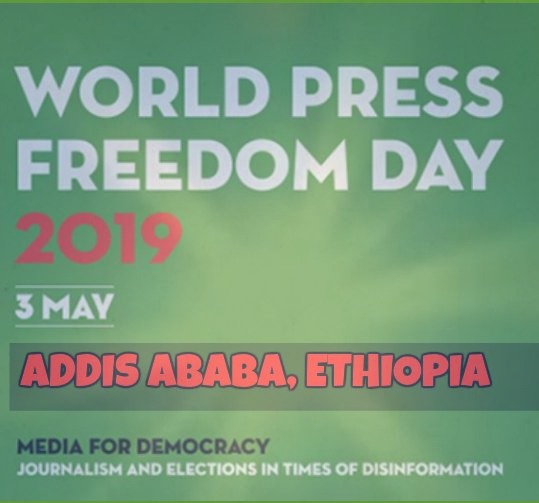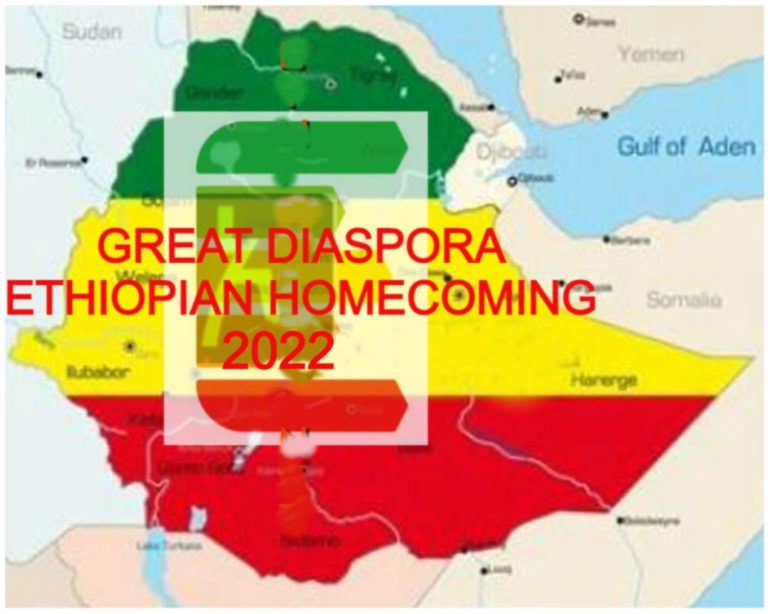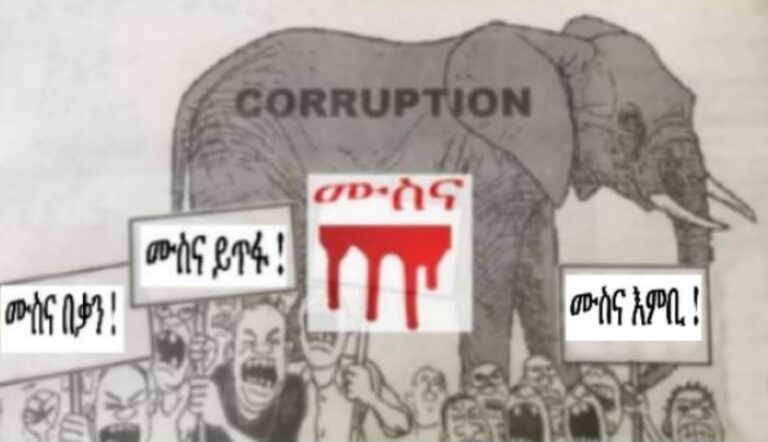Ethiopia: When Cheetahs Cry, They Growl!
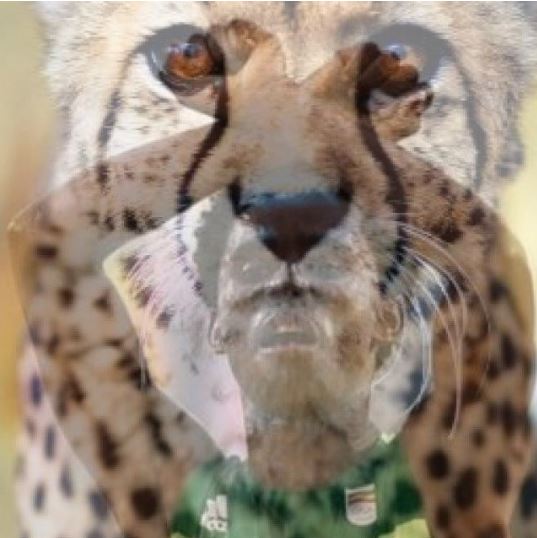 Americans have no monopoly on heroes. Olympic heroes, that is.
Americans have no monopoly on heroes. Olympic heroes, that is.
On August 21, 2016, Feyisa Lelisa, the 26-year-old Ethiopian long distance runner at the Rio Olympics repeated an act that was once described as the “the most overtly political statement in the history of the modern Olympic Games.”
On October 16, 1968, Tommie Smith and John Carlos won gold and silver in the 200-meter dash at the Mexico City Olympics. What they did on the medal platform is now the stuff of legend. They raised their fists in a defiant Black Power salute.
As Feyisa approached the finishing line, he raised both arms over his head and held them crosswise, in the signature gesture of Ethiopia’s defiant Youth Power Movement.
It was a gesture seen by 3.5. billion people worldwide.
In that fleeting moment, Feyisa met his moment of truth. He had the choice of clinching his silver medal and strolling into fame, fortune and glory.
He also had the choice of remaining in the ordinary world of mediocrity like the rest of us and let the moment define him.
But Feyisa chose to seize the moment and define it his way.
In defining the moment, Feyisa became the live hero giving life to the mythical hero with a thousand faces Joseph Campbell wrote about in his books.
Feyisa became the face of the Ethiopian hero.
By crossing his hands as he crossed the finishing line, Feyisa crossed into the hero’s world.
What made Feyisa to take such heroic action and transform himself from an extraordinary marathon runner to a heroic human being?
Simple! He changed his mind.
George Bernard Shaw said, “Progress is impossible without change, and those who cannot change their minds cannot change anything.”
Feyisa understood radical changes are urgently needed in his country. In a fleeting moment, he changed his mind and declared that one moment of freedom is much more valuable to him than a lifetime of privilege and wealth as a second-class citizen licking the boots of his oppressors.
When Feyisa crossed the finishing line in Rio, he did not cross into athletic victory. Not at all!
He crossed the threshold into a life of courage, sacrifice, determination, steadfastness and purpose leaving behind a life of fear, despair, sorrow, wretchedness, misery and doubt.
In the last seconds of his run, Feyisa heard the clarion call.
Like Joseph Campbell’s mythical hero with a thousand faces, Feyisa was called to adventure from the ordinary world by a greater cause.
Feyisa agonized over the call. He said he had thought about doing what he did for a long time. Like Campbell hero, when his moment arrived, Feyisa did not waffle or hesitate. He literally and resolutely crossed the threshold from the ordinary world of self-centeredness, self-aggrandizement, and self-love to the world of real live heroes who would brave any danger and sacrifice themselves for the greater good of the community.
Like Campbell’s mythical hero who risked everything, Feysa in real life risked his life for his people, his country, his young children, his wife and his extended family.
But for what!?
In 1968, two college Students from San Jose State University in Northern California also crossed the threshold into “hero-dom” by raising their fists in the air defiantly.
Carlos, age 23 and Smith, age 24, risked all the trappings of success – fame, fortune and glory. They were booed, condemned, vilified, threatened, damned and ridiculed in public. They were even forced to return their medals to the International Olympic Committee.
Why did they make such a sacrifice!?
Carlos’ and Smith’s photo with their Black Power salute is forever etched in my mind.
As a high school student in the heart of the Horn of Africa, I identified personally with the civil rights and youth protest movements in America, particularly with the young rebels in the “People’s Republic” of Berkeley and Oakland, California.
Why?
Shakespeare wrote in the Twelfth Night, “Some are born great, some achieve greatness, and some have greatness thrust upon them.”
I wonder if Shakespeare considered whether some people are also born doomed to always defend the underdogs, condemned to bark and yap truth to the Uber-dogs.
I wonder.
I have seen the video of Smith and Carlos sprinting like cheetahs on the hunt to win gold and silver and their subsequent interviews more than a few times, as I have Feyisa dash to the finish line.
The Olympic duo held up their glove-fisted hands in the air with their heads bowed as the “The Star-Spangled Banner” played out.
But why did they raise their hands in the controversial Black Power salute?
Why did Feyisa raise his hands crosswise over his head as he crossed the finish line?
Carlos and Smith were using the world stage to protest the racism, poverty and second-class citizenship inflicted on African Americans on the world stage.
But their defiant actions were not limited to the raised fists. They also stood shoeless on the medal platform to symbolize the crushing poverty in the daily lives of the vast majority of African Americans. Carlos even wore a necklace of black beads which he said symbolized his identification with “those individuals that were lynched or killed that no one said a prayer for, that were hung tarred. It was for those thrown off the side of the boats in the middle passage.”
Feyisa raised his hands crosswise to protest oppression and second-class citizenship under the rule of a criminal gang of thugs called the “Tigrean People’s Liberation Front”, or more accurately, the Thugtatorship of the Tigrean People’s Liberation Front (T-TPLF).
When asked why he took such dramatic action on the global stage, Feyisa said:
The Ethiopian government are killing the Oromo people and taking their land and resources so the Oromo people are protesting and I support the protest as I am Oromo. The Ethiopian government is killing my people so I stand with all protests anywhere as Oromo is my tribe. My relatives are in prison and if they talk about democratic rights they are killed. I raised my hands to support with the Oromo protest.
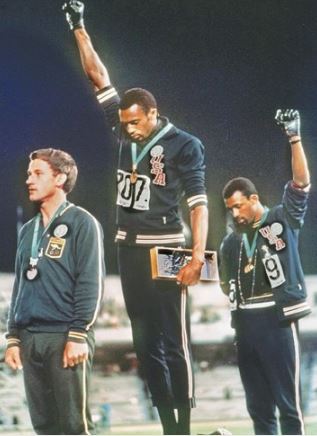 What Feyisa said was not that much different in substance from what Smith and Carlos said in 1968.
What Feyisa said was not that much different in substance from what Smith and Carlos said in 1968.
Interviewer: Do you think the Olympic games is the right place to do this kind of thing, that you ought to use this as a world stage?
Smith: We are athletes. I am a teacher but I am not a politician. We used this so the whole world could see poverty of the black man in America.
Interviewer: You got publicity, fame, medals, martyrdom?
Carlos: I can’t eat that. And the kids around my block who grew up with me can’t eat it. And the kids that are going to grow up after them, they can’t eat that. They can’t eat gold medals. All we ask for is an equal chance to be a human being. And as far as I see now, we’re 5 steps below the ladder. And every time we try to touch the ladder, they put their foot on our hands and they don’t want us to climb up.
Of course, Carlos and Smith were not alone when they stood on the medal platform and raised their hands defiantly protesting racism and second-class citizenship for African Americans. Millions of America’s youth and people throughout the world were with them.
Feyisa was not alone as he crossed the finishing line with his hands held help up crosswise over his head. He had the spiritual support, love and admiration of 100 million of his fellow Ethiopians.
The picture of Carlos and Smith with their glove-fisted hands in the air may have been worth a thousand words, but to me, their historic act represented only one word: DEFIANCE!
Their defiance represented determined peaceful resistance to an oppressive and racist system.
Their defiance represented their heartfelt identification with the Civil Rights Movement and the mass struggle for identity and full citizenship rights in America.
Smith did not overlook the paradox in his situation. “If I win, I am American, not a black American. But if I did something bad, then they would say I am a Negro. We are black and we are proud of being black. Black America will understand what we did tonight.”
The eternal Shakespearean irony of being black in America: To be or not to be…
Or is it to be… while black?
Carlos and Smith in that gesture proclaimed to the world, “We will stand our ground. We won’t be pushed around.”
It was their way of singing silently the African American spiritual, “I shall not be moved.” as the “The Star-Spangled Banner” played on.
I have no doubts whatsoever Feyisa Lelisa was inspired by Carlos and Smith.
Like Carlos and Smith, Feyisa let his courage to speak for his people. He let the T-TPLF know that he is not afraid of their jails and torture chambers. He knows the T-TPLF will make the lives of his family a living hell. Of course, nothing less can be expected from the Masters of Hell.
But in that single defiant gesture, Feyisa showed his absolute solidarity with his young brothers and sisters in Ethiopia dying at the hands of the T-TPLF; getting arrested, jailed and tortured by the T-TPLF.
As Feyisa approached the finish line, it was clear to all who witnessed that he was not seeking Olympic glory and the fame and fortune that comes with it.
Feyisa was running the marathon race of his life for the life and dignity of his people.
He was running to save his people, not to win a medal.
He had trained for years and ran over the hills and vales for this one timeless moment.
He could not speak for his mouth had been sealed by the T-TPLF.
But he could speak with his feet. How feet can speak louder than words!
Carlos and Smith were also running not for themselves but the human race.
In 2011, at the San Jose State University Sculpture Unveiling Ceremony for Smith and Carlos commemorating their historic stand in 1968, Dr. Carlos said:
Whatever we did in Mexico City, we did something that would be prestigious, respectable, pungent, shocking and revealing. We didn’t give the finger. We didn’t give the butt. We didn’t wrap the flag around our head or tie it up like a diaper. We didn’t stand there with disrespect. We stood there to say “Hey, man. I am American. I am your son. I am wounded. I am not wounded for me because I am one of your heroes. I am in the Olympics. I am wounded for the race. I am not talking about the 200 meters. I am talking about the human race. That’s why we went to Mexico city.
By raising his arms, Feyisa brought to the conscience of the world the pain, suffering, trials and tribulations Ethiopians are facing under the T-TPLF, a criminal racketeering organization masquerading as a government in Ethiopia. (See my recent commentary “Beyond the Politics of Hate”.)
Like Smith and Carlos, Feyisa was saying that his people, his children, his family and his neighbors cannot eat a silver medal. The silver medal does not buy them dignity, freedom and human rights.
Like Smith and Carlos, Feyisa just wanted his people to be treated like human beings with equal opportunity. Not as second class citizens. Not as criminals and terrorists. Just human beings created in the image of God with God-given rights to life, liberty and the pursuit of happiness.
Feyisa wants his people to be able to climb up the ladder, and not just hold the ladder so that the T-TPLF, its members and cronies can sit at the top of the ladder kicking everybody in the face trying to climb up.
On August 21, 2016 in Rio, Feyisa Lelisa showed the world what it means to be an Ethiopian Cheetah and made all Ethiopians proud as a peacock; or is it proud as a pride of lions?
But Feyisa’s message to his fellow citizens was clear: “I just told 3.5 billion people about your suffering and trials and tribulation under the TPLF thugs.”
He even called the T-TPLF, “the Ethiopian government”.
Feyisa must be a man of great charity to call that gang of bloodthirsty thugs, “government”.
Calling the T-TPLF “government” is like calling a cackle of hyenas a pride of lions.
One has to call a spade a spade. Or a hyena, a hyena.
The TPLF is a government of thugs, for thugs, by thugs. (See my May 2011commentary, “Thugtatorship: The Highest Stage of African Dictatorship”.)
Thugs will always be thugs, even in designer suits. Hyenas will always be hyenas even when they are laughing.
Lions will always be lions and hyenas know the roar of lions and the growl of cheetahs.
But Feyisa is a lion and cheetah rolled into one.
On the same day Feyisa won his silver medal, the T-TPLF had unleashed swarms of its security, police and military goons to prevent peaceful protests in the capital Addis Ababa.
How ironic! By forcing millions of protesters to stay home, the T-TPLF made it possible for them to watch their job being done beautifully by one of their own before 3.5 billion people.
As I saw the video of Feyisa approaching the finishing line, he reminded me of the Chinese “tank man” who in June 1989 stood in front of a column of tanks in Tiananmen Square and refused to move in a gesture of “I shall not be moved.”
One little guy refusing to stand down before the mighty Chinese Army and security forces that had massacred hundreds of peaceful protesters.
That anonymous little guy was not afraid of what the Chinese war machine could do to him.
Is Feyisa afraid of what the T-TPLF could do to him?
Feyisa told it straight.
The T-TPLF will kill him if he returned. “If not kill me, they will put me in prison. I have not decided yet, but maybe I will move to another country.”
Feyisa’s mother was unafraid when she said, “Do you believe what the government says? He should stay there. I want him to stay there. I wish him well.”
Feyisa’s wife knew how strong her husband is: “I was scared at the time but I wasn’t surprised because I know him. He was burning inside when he saw on social media all of the dead bodies, people being arrested, people being beaten. So I was not surprised because I know he had a lot of anger inside.”
Feyisa was not going to stand down in the face of what the TPLF thugs will do to him. For him, it is, “Damn the torpedoes, full speed ahead.”
In his simple gesture, Feyisa showed the T-TPLF to be the proverbial Emperor with no clothes. Or did he show real live thugs in designer suits?
Is Feyisa concerned about losing his silver medal and punishment by the International Olympic Committee?
He could not care less about the little round piece of metal or the fame and fortune it brings. He was infinitely more concerned about the welfare of his people. He said, “I cannot do anything about that [what the IOC may do]. This was my feeling. I have a big problem in my country. It is very dangerous to make protest in my country.”
That sounded to me like, “The IOC can take their two-bit clump of metal and shove it up their… My dignity and the dignity of my people is not for sale at the Olympics market or anywhere else..”
May God bless Feyisa and his family!
Ethiopia’s youth united can never be defeated
In May 2011, I wrote a commentary entitled “Africa’s Youths United Can Never be Defeated”.
It was a commentary about the collapse of the Mubarak regime and how dictators use violence to impose their will. I explained that violence is the weapon of the weak. To shoot and kill and maim unarmed protesters in the streets is not a sign of strength, it is a sign of fear, weakness and cowardice.
In June 2010, I wrote a commentary entitled, “Speaking Truth on Behalf of Ethiopia’s Youth”. I presented evidence showing the wretched conditions of Ethiopia’s youth to argue they are a ticking demographic time bomb.
I argued that the evidence of Ethiopian youth frustration, discontent, disillusionment and discouragement by the protracted economic crisis, lack of economic opportunities and political repression is manifest, overwhelming and irrefutable. The yearning of youth for freedom and change is self-evident. The only question is whether the country’s youth will seek change through increased militancy or by other peaceful means.
In January 2013, I wrote a message to Ethiopia’s youth in a commentary entitled “Ethiopia 2013: Year of the Cheetah Generation”.
In my message, I called upon Ethiopia’s Cheetahs to begin an informal dialogue among themselves and to define their own terms of national reconciliation. I urged them to empower themselves and create their own political space and to talk one-on-one across ethnic, religious, linguistic, gender, regional and class lines. I urged Ethiopia’s Cheetahs to use their diversity as strength and must never allow their diversity to be used to divide and conquer them.
I underscored the importance of closing the gender gap and maximizing the participation of young women in their peaceful resistance efforts.
In my January 2014 commentary, “2014: Year of the Ethiopian Chee-Hippo Generation”, I wrote about the challenges faced by young people in Ethiopia. I declared, “Ethiopian Cheetahs at grave risk.”
I argued that the problem of 21st Century Ethiopia is quintessentially the problem of Ethiopian youth. According to the U.S. Census Bureau, in less than 34 years, Ethiopia’s population will more than triple to 278 million, placing that country in the top 10 most populous countries in the world. Today, an estimated 70 percent of Ethiopia’s one hundred million plus population is under 35 years old (66 million).
Nelson Mandela observed, “Our children are our greatest treasure. They are our future. Those who abuse them tear at the fabric of our society and weaken our nation.”
If Ethiopia’s youth are its greatest treasure, they are indeed at extreme risk today; and so is the future of that country. Ethiopia’s greatest treasures are neglected, abused, squandered and wasted. “Ethiopia is one of the countries with the lowest primary school enrollment rates in the world… [L]ow quality of school and a high dropout rate, as well as gender and rural-urban disparities remain the major challenges of the country” according to a report of the African Population and Health Research Center. Those who manage to finish high school have vastly diminished opportunities for higher education or gainful employment.
According to a 2012 USAID study, “Ethiopia has one of the highest urban youth unemployment rates at 50 percent and there is a high rate of youth underemployment in rural areas, where nearly 85 percent of the population resides.” Another 2012 study of youth unemployment by the International Growth Center reported that the “current 5 year [Ethiopian] development plan 2010/11-2014/5, the [ruling regime’s] Growth and Transformation Plan (GTP), does not directly address the issue of youth unemployment…” That study found “in 2011, 38 percent of youth were employed in the informal sector” which “often provides low quality, low paying jobs.”
There is a substantial segment of the youth population that is not only unemployed but also unemployable because they lack basic skills. Youth access to public sector jobs requiring training and skills depends not so much on merit or competition but political and social connections and party membership. Every young person in Ethiopia knows that a card verifying membership in the ruling party is more important than an honestly earned university diploma. Moreover, rural youth landlessness has contributed significantly to the chaotic and ever increasing pattern of youth urban migration, joblessness and hopelessness.
The risks faced by Ethiopia’s youth cover the gamut of social maladies.
According to a 2010 T-TPLF report, there are 150,000 children living on the streets, some 60,000 of them in the capital. The average age at which children first find themselves homeless is between the age of 10 and 11 years. Health risks for youth from HIV/AIDS and other sexually transmitted diseases are on the increase. Large numbers of young people who lack opportunities are involved in drug and alcohol abuse, prostitution and other criminal activities. Without job or educational opportunities in the urban areas, large numbers of youth are rendered jobless, homeless, helpless and hopeless.
In 2004, the T-TPLF issued its “National Youth Policy” and in its assessment reported that “44% of the population is below the absolute poverty line. Under this situation of poverty, the youth is the hardest hit segment of society… The fact that the majority of the unemployed youth constitute females indicates the magnitude to which young women are the main victims of the problem.” The policy directs that the “Government shall have the responsibility to direct, coordinate, integrate and build the capacity for the implementation of this policy.”
Yet, as a 2012 International Growth Center study showed, the “current 5 year [Ethiopian] development plan 2010/11-2014/5, the Growth and Transformation Plan (GTP), does not directly address the issue of youth unemployment.” Taken as a whole, the so-called National Youth Policy was nothing more than a blueprint for T-TPLF youth recruitment.
A 2014 report documents how rural Ethiopian youth are using internal migration to escape rural poverty.
For years, I have been telling the world that Ethiopia’s Cheetahs would rise one day soon and save the day. Save Ethiopia from the T-TPLF hyenas.
I am proud to say I have been right all along!
In February 2016, in my commentary, “A Special “Message in a Bottle” to Ethiopian Cheetahs: Born Free, Live Free!”, I forewarned what is to come:
I believe Ethiopia’s Cheetahs have fully awakened. Some Cheetahs are purring in anger and standing up to the T-TPLF defiantly as we continue to witness today. Others are hissing and growling. Ethiopian Cheetahs are not happy. That’s why they are prowling all over the country confronting hyenas.
In January 2016, The Economist magazine asked a question that has been on my mind for years. The question hit me like a thunderbolt: “What if Ethiopians were really set free?”
The Economist answered its own question: “If the government let [the Ethiopian] people breathe, they might fly.”
I took a flight of imagination in my commentary, “Fly, Ethiopia, fly…”
If Ethiopians could fly, I said, they would not have to take to the sea to die. Ethiopian women wouldn’t have to fly to the Middle East to become virtual slaves. They would not have to cross the desert and become victims of bloodthirsty terrorists. They would not have to go into exile. If they could fly, they would soar like the African fish eagles, like African seagulls. They would lift their wings high, high into the sky and fly. They would flutter like humming birds.
I want Ethiopia’s youth to fly.
I want them to take flight in their imagination.
I want to challenge them to imagine a new Ethiopia that is their own creation free of ethnic politics, sectarianism and hate.
I want them to imagine an Ethiopia at peace with itself and its neighbors; an Ethiopia free of oppression and thugtatorship.
I want to challenge every Ethiopian Cheetah to become an architect, a designer, an inventor, a surveyor, a builder and entrepreneur of a free Ethiopian society whose citizens are more concerned about each other’s humanity than their own ethnicity; an Ethiopia of equal opportunity; an Ethiopia free of corruption, oppression and thugtatorship.
I want them to imagineer an Ethutopia.
Winning hearts and minds, not medals
I have always been in the corner of Ethiopian Cheetahs, come hell or high water. (See my January 2013commentary “Rise of the Chee-Hippo Generation”.)
In that commentary, I explained to Ethiopia’s Cheetahs that at the core their struggle for freedom, democracy and human rights in Ethiopia is an unending battle for the hearts and minds of the people. In the battlefield of hearts and minds, guns, tanks and warplanes are useless. History bears witness. The US lost the war in Vietnam not because it lacked firepower, airpower, nuclear power, financial power, scientific or technical power. The U.S. lost the war because it lacked the power to win the hearts and minds of the Vietnamese and American peoples.
Life is not about winning medals
It is about wining hearts and minds.
The IOC took its tinsel medals from Smith and Carlos. Buy the dynamic duo proved to be indefatigable human rights advocates for over four decades.
It is not clear whether the IOC will take Feyisa’s medal.
Like Smith and Carlos, Feyisa also won the biggest medal of the 2016 Olympic – the hearts and minds of not only his people but also billions of other freedom-loving people throughout the world.
In time, Feyisa will also be appreciated as a global champion of human rights just like Smith and Carlos.
I believe what Smith, Carlos and Feyisa did was a truly patriotic act in the spirit and words of the founding American patriots.
Young Alexander Hamilton wrote, “There is a certain enthusiasm in liberty that makes human nature rise above itself, in acts of bravery and heroism.” Hamilton believed Britain’s having a professional army could be overcome by the rebel army’s sheer bravery and enthusiasm. Carlos and Smith believed a grassroots army of civil righters could overcome racism and poverty in America. Feyisa translated his enthusiasm for liberty into a simple act of bravery and heroism seen by billions worldwide.
Young James Madison, (the “father” of the American Constitution) gloried in a revolutionary spirit of national unity and purpose: “A spirit of liberty and patriotism animates all degrees and denominations of men.” A spirit of liberty and patriotism animated Feyisa in 2016 as it did Carlos and Smith in 1968.
The agitator Samuel Adams warned, “For true patriots to be silent, is dangerous.”
The true American patriots Smith and Carlos and the Ethiopian patriot Feyisa Lelisa were “silent” on the Olympic platform but their gestures of raised fists and crossed hands spoke volumes about racism, ethnic hatred, injustice and discrimination.
Ethiopian Cheetahs growl on the prowl
George Ayittey, the Ghanaian economist who authored the “Cheetah-Hippo” metaphor to explain the crises of leadership in Africa observed that Africa’s Cheetahs “are dynamic, intellectually agile, and pragmatic. They may be the ‘restless generation’ but they are Africa’s new hope. They brook no nonsense about corruption, inefficiency, ineptitude, incompetence, or buffoonery.”
Behold Feyisa Lelisa!
Behold Ethiopia’s Cheetahs, the hopes of Ethiopia.
I have always said that if Ethiopians have a chance of survival as a nation and as a people, that survival will depend on the creativity, stamina, determination, goodwill, commitment and sacrifices of its youth. That places an extreme burden on the youth. They must do the lion’s share (not the Cheetahs’) of the heavy lifting, the hard work and the sacrifices.
Similarly, if Ethiopia’s youth are to survive and have a chance, their survival will depend on the active and sustained support of the older generation to the upcoming generation.
Ethiopia’s Hippo (older) generation must do all it can to make sure our Cheetahs will not falter and fail. If they do, we must help them get up, dust off and do it again and again. We Hippos must stand by our Cheetahs all the way, no matter how long it takes, come hell or high water. We must dialogue with them and assure them we will support them and love them; we must gladly serve as water carriers so long as they remain on the construction site of the “New Ethiopia”.
Most of us Hippos never miss an opportunity to miss an opportunity to do great things. (Ouch! How the truth hurts!)
That is not to do great things for ourselves. For others. For the powerless, the defenseless, the hopeless, the homeless, the countryless, and comfortless.
Let us not miss this sacred opportunity to stand by and support our Cheetahs.
The hero’s journey
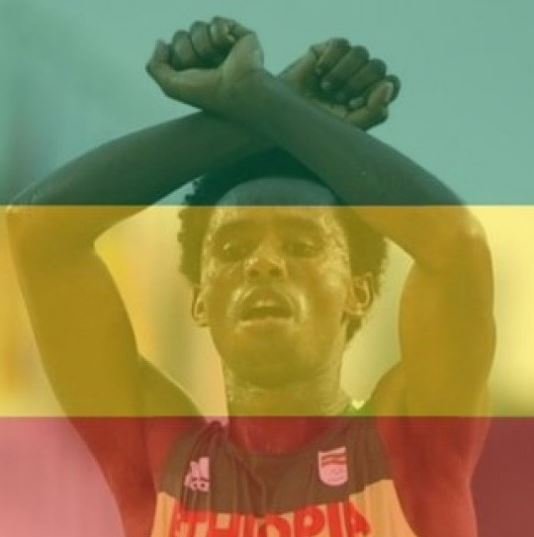 Joseph Campbell’s hero with a thousand faces faces all types trials and tribulation in his world of hero-dom on his way to ultimate victory. He faces harrowing ordeals, anguish, agony and tribulation. He even faces death in the face. But the hero prevails against all odds.
Joseph Campbell’s hero with a thousand faces faces all types trials and tribulation in his world of hero-dom on his way to ultimate victory. He faces harrowing ordeals, anguish, agony and tribulation. He even faces death in the face. But the hero prevails against all odds.
Feyisa too in his new world of hero-dom will face the greatest challenges and opportunities of his life.
No doubt, he will undergo feelings of self-doubt, self-pity, self-reproach, grief, guilt, regret, fear, remorse, sorrow and anger.
No doubt, he will miss his children and wife beyond words can express. But these are all too human qualities for real human beings, not demons in the flesh.
Such are the unbearable burdens of the long distance runner.
But Feyisa will also revel in the knowledge that he sacrificed everything so that his children, his wife, his parents and his people can live in dignity and freedom like any other human being.
I have no doubt Feyisa and all of us who stand with him and run with him in the marathon for democracy freedom and human rights in Ethiopia will win gold in the end. A marathon is not a sprint, so we must keep on running but pick up the pace.
The hero’s journey is never easy. That is why we have so few real heroes in the world who would accept such burdens willingly.
Most of us fear change and we fear changing our minds the most; so we live a life of quiet desperation under a blanket of fear.
Feyisa’s role as a hero with an Ethiopian face is defined by the fact that he has become the sentinel, the guardian, the watchman of freedom, democracy and human rights for all Ethiopians.
Feyisa shall soon return to his homeland, like Campbell’s mythical hero, with the “elixir”, the treasure, in hand for which he gave up EVERYTHING.
Perhaps we should not even applaud Feyisa for his bravery and heroism.
He only did with his feet and hands what his forefathers did with their blood, sweat and tears to keep Ethiopia free from foreign subjugation, colonialism and imperialism for millennia.
The only difference is that Feyisa is sacrificing everything to rid his country of a gang of criminal thugs.
Feyisa’s rebirth as a true patriotic Ethiopian hero will be complete when he reunites with his family in a land freed from the scourge of thugs, gangsters and criminals.
I do not doubt that millions will come out to line the streets to greet Feyisa when he comes marching home…
Oh, when the saints come marching home… the devils march straight to hell.
Re-sending my 2011 message to Ethiopia’s youth in 2016
In May 2011, I sent my “humble message” to Ethiopia’s youth:
I have no magic formula for any of the problems faced by Ethiopia’s youth. My humble message to all young Ethiopians is simple. Never give up. Never! Emancipate your minds from mental slavery. Develop your creative powers. Learn and teach each other. Unite as the children of Mother Ethiopia, and reject any ideology or effort that seeks to divide you on the basis of ethnicity, language, region or class. Study and acquire knowledge not only about the arts and sciences but also your legal, constitutional and human rights.
In 2016, I send the message again with urgency:
Know in every fiber of your body that Ethiopia’s youth force is unstoppable. There is no force on earth and no dictatorship strong enough to defeat Ethiopia’s growling Cheetahs.
Never give up. Never! Never!!
Unite as the children of Mother Ethiopia.
Reject any ideology or effort that seeks to divide you on the basis of ethnicity, language, religion, region or class.
Raise your arms crosswise in the direction of the heavens and march on. In peace.
Believe that when the saints come marching in, the devils are put to flight.
Remember, your struggle is not against an ordinary earthly force.
Your struggle is against a Satanic force from the netherworld.
Your struggle is against the surviving army of the Prince of Darkness.
But I assure you that you shall be victorious because God is on your side.
Believe!
It was written long ago that false princes shall fall and become dust, and “Ethiopia shall soon stretch out her hands unto God.”
Stretch out your hands in peace to your fellow Ethiopians!
Hold your hands in the aid and cross them, for the Devils can never cross the cross.
“Crying may last for a night, but joy comes in the morning.”
It is morning time now!
Onward, Ethiopia’s youth! March on!
Keep on growling, Ethiopian Cheetahs!
Victory is at hand! Victory is at hand!
Believe!
Ethiopia’s youth united can never be defeated!!!
Power to Ethiopia’s Young People!



